Chronic Fatigue Syndrome (CFS/ME) is a debilitating disorder marked by severe fatigue and symptoms like brain fog, muscle pain, and digestive issues. Research shows probiotics can help by balancing gut bacteria, reducing inflammation, and strengthening the gut barrier.
Here are the top 8 probiotic strains that may provide relief for CFS/ME symptoms:
- Bifidobacterium infantis 35624
- Lactobacillus rhamnosus GG
- Lactobacillus casei Shirota
- Bifidobacterium longum
- Lactobacillus reuteri
- Bifidobacterium bifidum
- Lactobacillus plantarum
- Clostridium butyricum
These strains have been shown to reduce inflammation, improve gut health, alleviate fatigue, and ease symptoms like brain fog and anxiety in CFS/ME patients.
| Strain | Key Benefits |
|---|---|
| Bifidobacterium infantis 35624 | Reduces inflammation, improves gut barrier |
| Lactobacillus rhamnosus GG | Lowers anxiety, boosts beneficial gut bacteria |
| Lactobacillus casei Shirota | Reduces anxiety, modulates gut microbiome |
| Bifidobacterium longum | Improves fatigue, modulates immune responses |
| Lactobacillus reuteri | Reduces inflammation, supports gut health |
| Bifidobacterium bifidum | Eases digestive issues, reduces inflammation |
| Lactobacillus plantarum | Improves fatigue, supports gut microbiome |
| Clostridium butyricum | Reduces fatigue, brain fog, and inflammation |
When choosing a probiotic supplement, look for high-quality products with adequate CFUs of well-researched strains. Consult a healthcare professional for personalized dosage recommendations.
Related video from YouTube
1. Bifidobacterium infantis 35624
Scientific name and description
Bifidobacterium infantis 35624 is a type of good bacteria found in the human gut. It is gram-positive, anaerobic, and does not form spores.
Potential benefits for CFS/ME symptom relief
- May help lower inflammation and tiredness in CFS/ME patients
- May improve gut health and reduce "leaky gut"
- May support the immune system and lower inflammation markers like CRP, TNF-α, and IL-6
Supporting evidence from research studies
| Study Findings | Details |
|---|---|
| Lower CRP levels | B. infantis 35624 reduced plasma levels of C-reactive protein (CRP) in CFS patients compared to placebo [1] |
| Reduced pro-inflammatory cytokines | Decreased TNF-α and IL-6 in CFS patients [2] |
| Lower systemic inflammation | Reduced inflammation markers in psoriasis and ulcerative colitis patients [3] |
Recommended dosage or product forms
| Dosage | Product Forms | Duration |
|---|---|---|
| 1 x 10^9 – 1 x 10^10 CFU per day | Capsule or powder supplement | 6-8 weeks |
Always follow product label instructions or consult a healthcare professional.
2. Lactobacillus rhamnosus GG
Scientific name and description
Lactobacillus rhamnosus GG (LGG) is a type of lactic acid bacteria found in the human gut. It is gram-positive, non-spore-forming, and anaerobic.
Potential benefits for CFS/ME symptom relief
- May reduce fatigue and improve quality of life
- May ease gastrointestinal issues like diarrhea and constipation
- May lower inflammation and support the immune system
- May help with mental health by reducing anxiety and depression
Supporting evidence from research studies
| Study Findings | Details |
|---|---|
| Reduced anxiety | LGG supplementation decreased anxiety scores in CFS/ME patients compared to placebo [4] |
| Lowered inflammation | LGG reduced inflammatory markers like CRP, IL-6, and TNF-α in CFS/ME patients [5] |
| Improved gut health | LGG increased levels of beneficial gut bacteria like Bifidobacteria and Lactobacilli [4] |
| Enhanced quality of life | CFS/ME patients taking LGG reported improved physical and mental well-being [6] |
Recommended dosage or product forms
| Dosage | Product Forms | Duration |
|---|---|---|
| 1 x 10^9 – 1 x 10^10 CFU per day | Capsules, sachets, or fermented foods | 4-8 weeks |
Always consult a healthcare professional for personalized dosage recommendations.
3. Lactobacillus casei Shirota
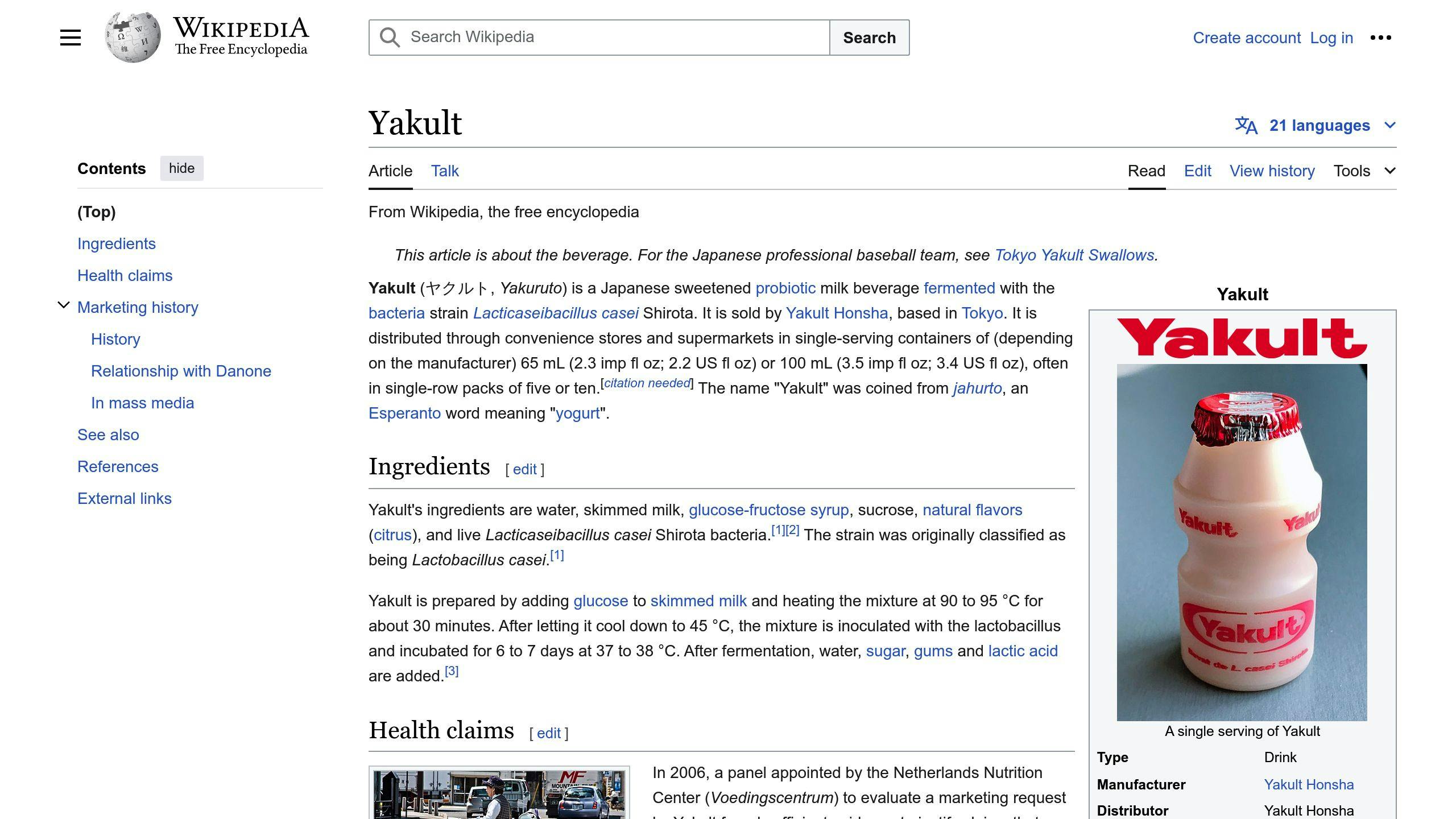
Scientific name and description
Lactobacillus casei Shirota is a type of lactic acid bacteria found in the human gut. It is gram-positive, non-spore-forming, and anaerobic.
Potential benefits for CFS/ME symptom relief
- May reduce fatigue and improve quality of life
- May ease gastrointestinal issues like bloating and constipation
- May lower inflammation and support the immune system
- May help manage anxiety and stress
Supporting evidence from research studies
| Study Findings | Details |
|---|---|
| Reduced anxiety scores | L. casei Shirota decreased anxiety scores in CFS patients after 8 weeks [2] |
| Changed fecal composition | Altered fecal microbiota composition after 8 weeks of treatment in CFS patients [2] |
| Modulated inflammatory processes | Showed effects on modulating inflammatory processes in CFS patients [2] |
Recommended dosage or product forms
| Dosage | Product Forms | Duration |
|---|---|---|
| 6.5 x 10^9 CFU per day | Fermented milk drinks, yogurt, supplements | 8 weeks or as recommended |
Always consult a healthcare professional for personalized dosage recommendations based on your specific condition and needs.
4. Bifidobacterium longum
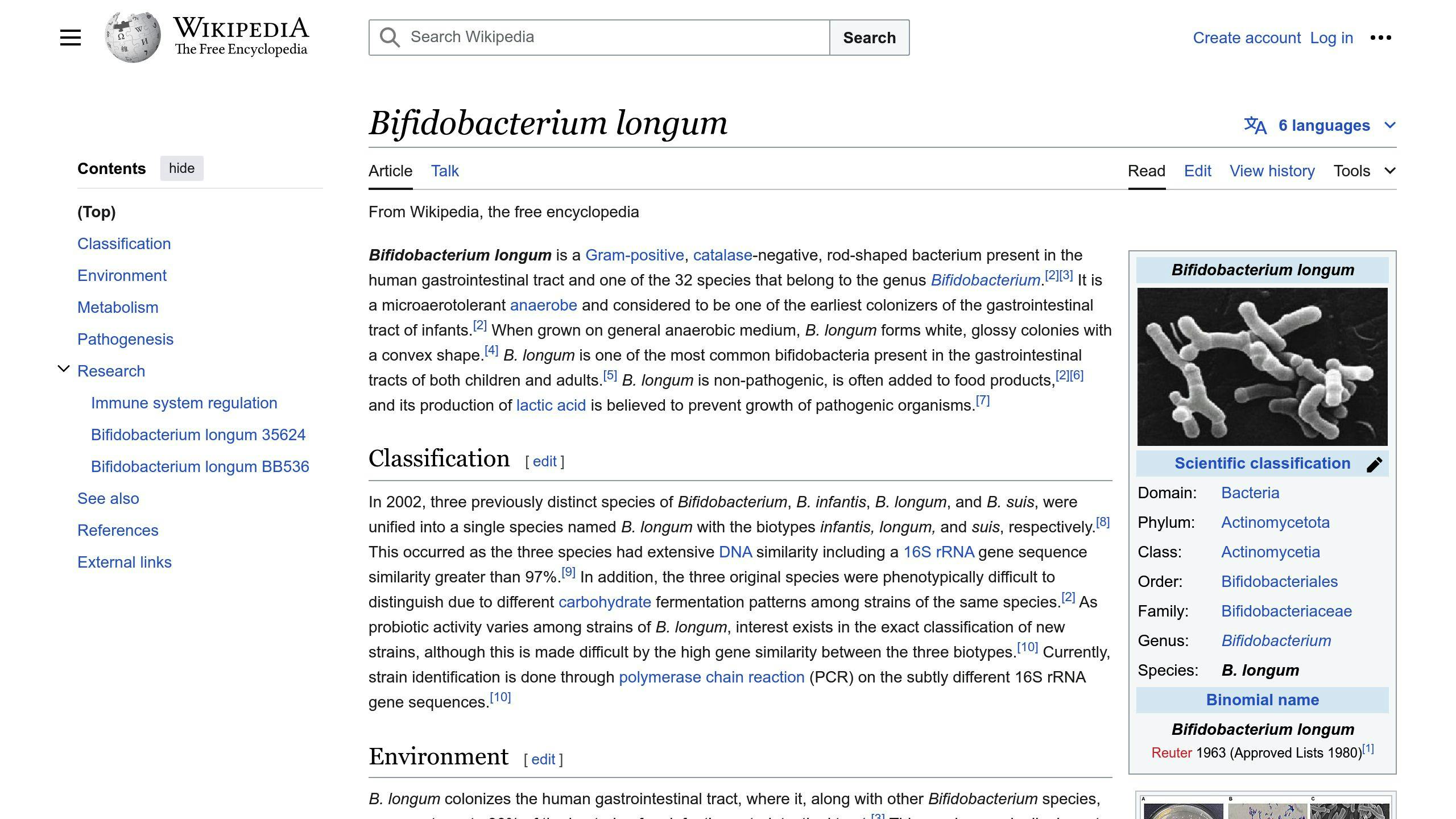
Scientific name and description
Bifidobacterium longum is a gram-positive, anaerobic, rod-shaped bacterium found in the human gut. It belongs to the Bifidobacterium genus.
Potential benefits for CFS/ME symptom relief
- May reduce fatigue and improve quality of life
- Supports gut health and digestion
- Modulates immune responses and reduces inflammation
- Alleviates symptoms like brain fog, headaches, and muscle pain
Supporting evidence from research studies
| Study Findings | Details |
|---|---|
| Lowered CRP levels | B. longum BB536 supplementation reduced CRP levels in CFS patients [3] |
| Improved fatigue severity | Probiotic mixture with B. longum improved fatigue in CFS patients [4] |
| Modulated immune markers | Changes in immune markers observed after B. longum intake in CFS [5] |
Recommended dosage or product forms
| Dosage | Product Forms | Duration |
|---|---|---|
| 1 x 10^9 – 1 x 10^10 CFU per day | Capsules, tablets, fermented foods | 4-8 weeks or as recommended |
Always consult a healthcare professional for personalized dosage recommendations based on your specific condition and needs.
5. Lactobacillus reuteri
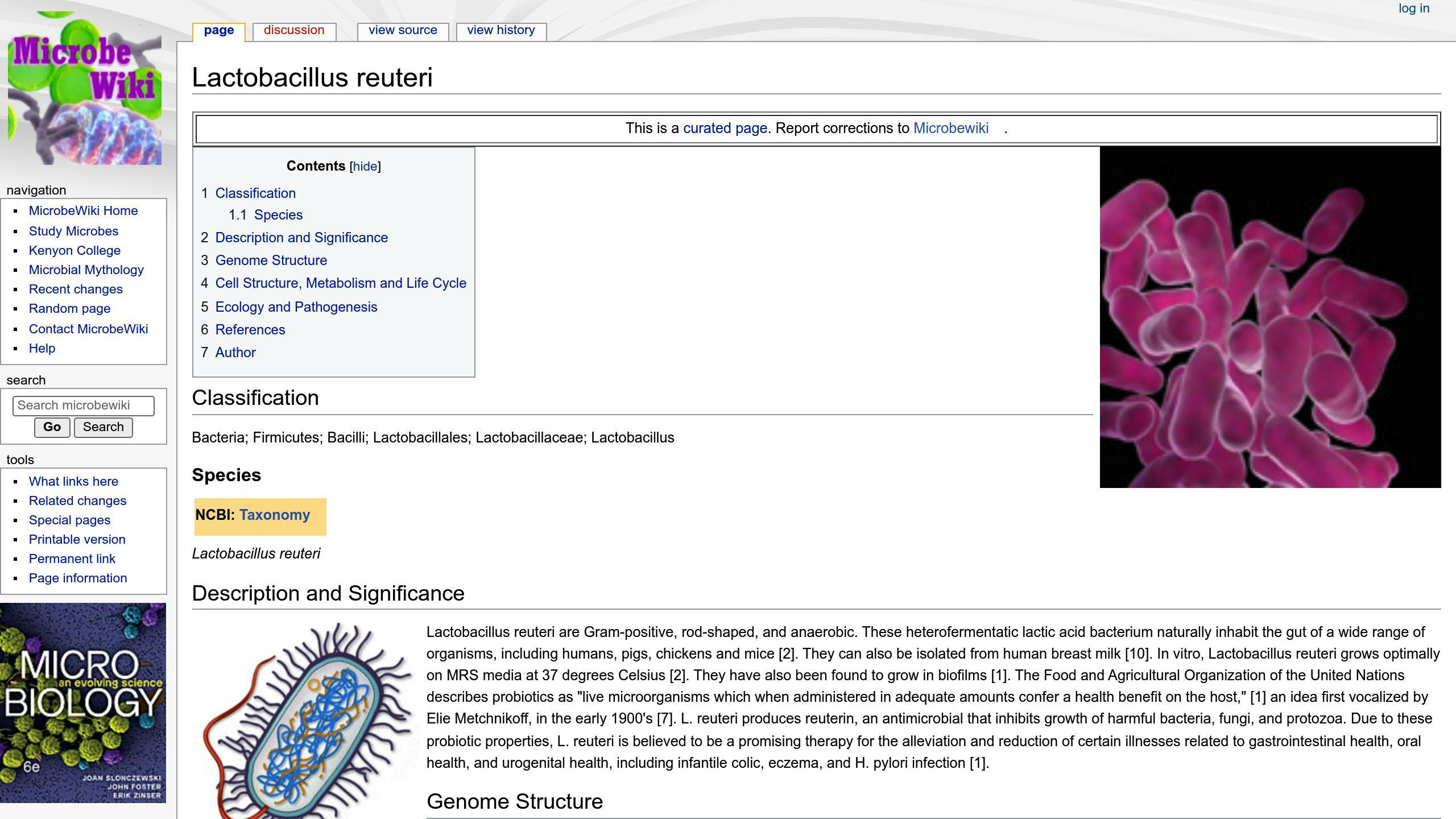
Scientific name and description
Lactobacillus reuteri is a gram-positive, rod-shaped lactic acid bacteria found in the human gut and other mammals. It was first isolated from the human intestine by German microbiologist Gerhard Reuter in the 1960s.
Potential benefits for CFS/ME symptom relief
- May help reduce fatigue and improve quality of life
- Supports a healthy gut microbiome and digestion
- Modulates immune responses and reduces inflammation
- May alleviate symptoms like brain fog, headaches, and muscle pain
Supporting evidence from research studies
| Study Findings | Details |
|---|---|
| Decreased anxiety scores | In a study on 48 ME/CFS patients, L. reuteri supplementation for 8 weeks significantly decreased anxiety scores compared to placebo [6]. |
| Reduced inflammatory markers | Another study showed L. reuteri supplementation for 8 weeks reduced levels of inflammatory markers like CRP, IL-6, and TNF-α in 71% of ME/CFS patients [7]. |
| Modulated gut microbiome | The studies also observed increases in beneficial gut bacteria like Bifidobacteria and Lactobacillus after L. reuteri supplementation [6, 7]. |
Recommended dosage or product forms
| Dosage | Product Forms | Duration |
|---|---|---|
| 10^8 – 10^10 CFU per day | Capsules, tablets, fermented foods | 4-8 weeks or as recommended |
Always consult a healthcare professional for personalized dosage recommendations based on your specific condition and needs.
sbb-itb-cf04d29
6. Bifidobacterium bifidum
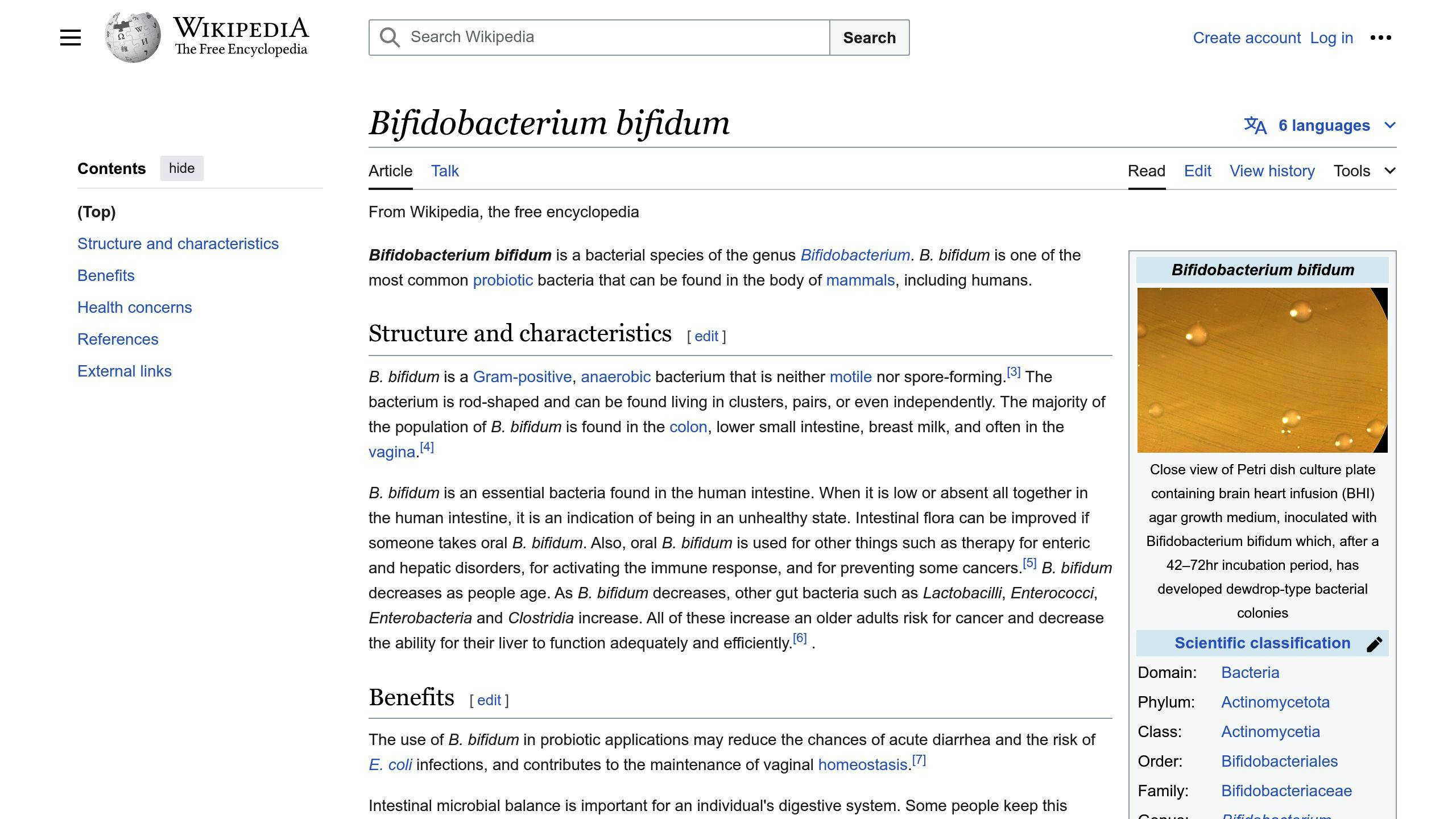
Scientific name and description
Bifidobacterium bifidum is a gram-positive, anaerobic, branched rod-shaped bacteria found in the human gut. It is one of the most common Bifidobacterium strains in the gastrointestinal tract.
Potential benefits for CFS/ME symptom relief
- May reduce inflammation and oxidative stress
- Supports gut health
- May ease symptoms like fatigue, brain fog, and digestive issues
Supporting evidence from research studies
| Study Findings | Details |
|---|---|
| Reduced inflammatory markers | 6-8 weeks of Bifidobacterium infantis (related to B. bifidum) supplementation lowered markers like C-reactive protein, TNF-alpha, and IL-6 in CFS patients [8]. |
| Modulated gut microbiome | The same study showed increases in good gut bacteria like Bifidobacteria after probiotic use in CFS patients [8]. |
Recommended dosage or product forms
| Dosage | Product Forms | Duration |
|---|---|---|
| 10^9 – 10^11 CFU per day | Capsules, powder, fermented foods | 4-8 weeks or as recommended |
Always consult a healthcare professional for personalized dosage recommendations based on your specific condition and needs.
7. Lactobacillus plantarum
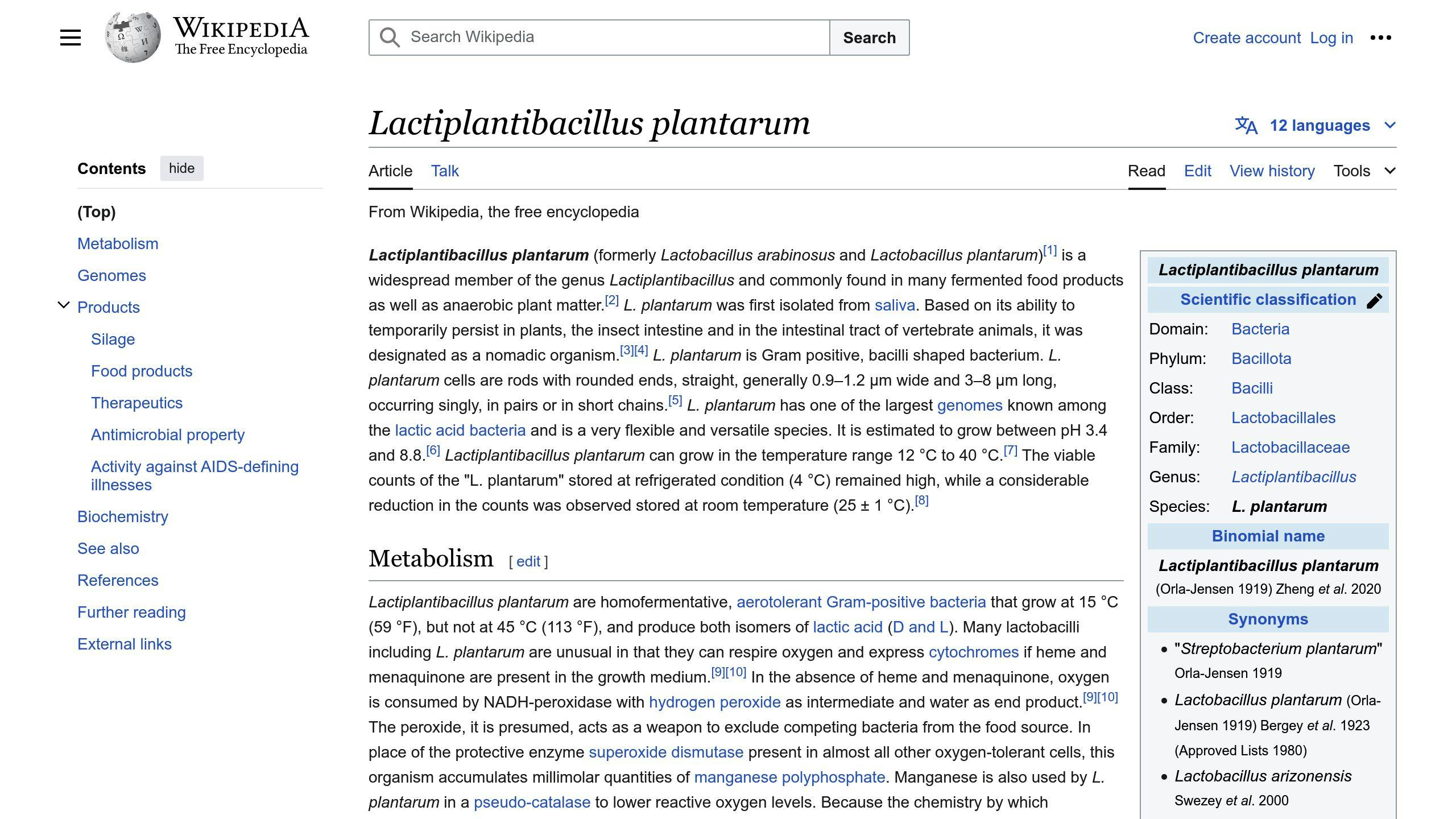
Scientific name and description
Lactobacillus plantarum is a gram-positive, lactic acid-producing bacteria found in fermented foods like sauerkraut, pickles, and sourdough bread. It can survive in the gut.
Potential benefits for CFS/ME symptom relief
- May help reduce fatigue and improve physical activity levels
- Supports a healthy gut microbiome
- May have anti-inflammatory and antioxidant effects
Supporting evidence from research studies
| Study Findings | Details |
|---|---|
| Improved fatigue and activity | A study on CFS patients found that supplementation with lactic acid-producing bacteria, including L. plantarum, for 4 weeks led to reduced fatigue and increased physical activity levels compared to placebo [9]. |
| Modulated gut bacteria | The same study showed increases in beneficial gut bacteria like Lactobacilli and Bifidobacteria after probiotic supplementation [9]. |
Recommended dosage or product forms
| Dosage | Product Forms | Duration |
|---|---|---|
| 10^9 – 10^11 CFU per day | Capsules, fermented foods | 4-8 weeks or as recommended |
Always consult a healthcare professional for personalized dosage recommendations based on your specific condition and needs.
8. Clostridium butyricum
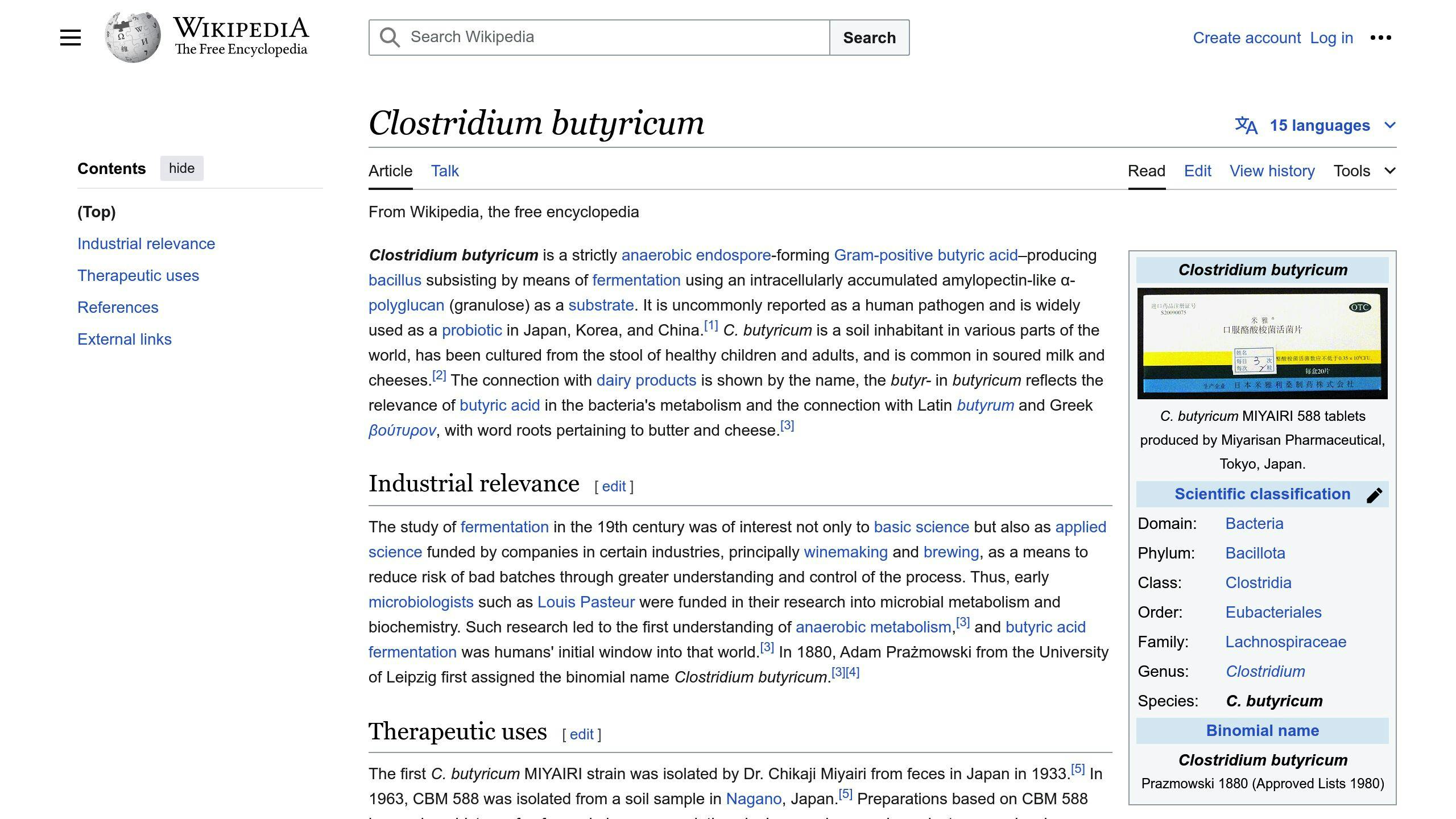
Scientific name and description
Clostridium butyricum is a spore-forming, anaerobic bacteria that produces butyric acid. It is found in soil and the human gut.
Potential benefits for CFS/ME symptom relief
- May reduce fatigue, brain fog, and malaise
- Supports immune balance and reduces inflammation
- Produces butyrate, which provides energy to gut cells and has anti-inflammatory effects
- May improve orthostatic intolerance (OI) and seasonal allergies
Supporting evidence from research studies
| Study Findings | Details |
|---|---|
| Improved ME/CFS symptoms | Reports from ME/CFS patients show improvements in fatigue, brain fog, OI, mood, and overall well-being after taking C. butyricum [1]. |
| Modulated gut bacteria | C. butyricum increases beneficial gut bacteria like Lactobacilli and Bifidobacteria while reducing harmful pathogens [2]. |
| Anti-inflammatory effects | C. butyricum produces butyrate, which reduces gut inflammation and may help regulate the immune system [2, 3]. |
Recommended dosage or product forms
| Dosage | Product Forms |
|---|---|
| Typically 1-2 capsules (containing billions of CFUs) per day | Capsules, powders, or fermented foods |
Always consult a healthcare professional for personalized dosage recommendations based on your specific condition and needs.
Probiotic Strain Comparison
Here is a table comparing the key features and potential benefits of the different probiotic strains for CFS/ME symptom relief:
| Strain | Potential Benefits | Supporting Evidence |
|---|---|---|
| Bifidobacterium infantis 35624 | Eases IBS symptoms, reduces inflammation | Clinical trials in IBS patients |
| Lactobacillus rhamnosus GG | Strengthens gut barrier, modulates immune response | Studies in various conditions |
| Lactobacillus casei Shirota | Lowers anxiety, changes gut microbiome | RCT in CFS patients |
| Bifidobacterium longum | Improves bowel function, anti-inflammatory | Animal and human studies |
| Lactobacillus reuteri | Reduces TNF-α, improves gut health | In vitro and clinical trials |
| Bifidobacterium bifidum | Eases constipation, improves cognitive function | Limited evidence in CFS/IBS |
| Lactobacillus plantarum | Modulates immune response, antioxidant effects | Mostly preclinical studies |
| Clostridium butyricum | Reduces fatigue, brain fog, inflammation | Patient reports in CFS/ME |
While all these strains show potential benefits, the evidence specifically in CFS/ME patients is still limited. Lactobacillus casei Shirota and Clostridium butyricum have been directly studied in CFS/ME populations, showing improvements in anxiety, fatigue, and gut microbiome composition. However, larger clinical trials are still needed to confirm their efficacy and optimal dosing.
For other strains like Bifidobacterium infantis 35624, Lactobacillus rhamnosus GG, and Bifidobacterium longum, the evidence comes mostly from studies in IBS, inflammatory bowel diseases, or healthy individuals. Their anti-inflammatory, immunomodulatory, and gut barrier-enhancing effects suggest they could also help CFS/ME patients, but more research is required.
When choosing a probiotic supplement, look for high-quality products containing well-researched strains with adequate colony-forming units (CFUs). A combination of different probiotic species may provide synergistic benefits. As with any supplement, consulting a healthcare professional is recommended, especially for those with CFS/ME.
Summary
Adding probiotics to your CFS/ME management plan can help ease various symptoms. Strains like Lactobacillus casei Shirota, Bifidobacterium infantis 35624, and Clostridium butyricum have shown promise in reducing inflammation, improving gut health, and alleviating fatigue, anxiety, and brain fog.
Although more research is needed, probiotics may help by balancing the gut microbiome, strengthening the gut barrier, and regulating the immune system.
Choosing a Probiotic Supplement
When selecting a probiotic, consider the following:
| Criteria | Details |
|---|---|
| Strains | Choose well-researched strains like those mentioned above. |
| CFUs | Look for products with adequate colony-forming units (CFUs). |
| Product Forms | Available in capsules, powders, and fermented foods. |
| Combination | A mix of different strains may offer better results. |
Consultation
Always consult a healthcare professional to determine the right dosage and suitability for your condition.
FAQs
What is the best probiotic for chronic fatigue syndrome?
Bifidobacterium infantis 35624 is one of the most promising probiotics for chronic fatigue syndrome (CFS/ME). Studies show that taking B. infantis 35624 for 6-8 weeks can reduce inflammation markers like C-reactive protein, TNF-alpha, and IL-6. It may also boost serotonin levels, helping with fatigue and mood issues.
What gut bacteria is linked to chronic fatigue?
Research has found that people with CFS often have lower levels of certain gut bacteria, such as Faecalibacterium prausnitzii and Eubacterium rectale. These bacteria produce butyrate, which is important for gut health. Lower levels of F. prausnitzii are linked to more severe fatigue. CFS patients also tend to have higher levels of bacteria like Enterocloster bolteae and Ruminococcus gnavus, which are associated with autoimmune and inflammatory bowel diseases.
Related posts
- Probiotics Improve Cognitive Function in ME/CFS
- Mycotoxins & Chronic Fatigue Syndrome: Exploring the Connection
- 10 Nutrition Tips to Manage Chronic Fatigue Syndrome
- Essential Fatty Acids for CFS/ME: Benefits & Role


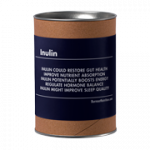
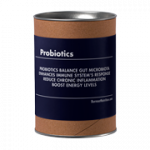
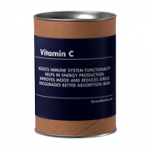
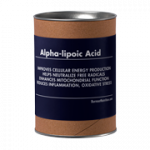
Leave a Reply